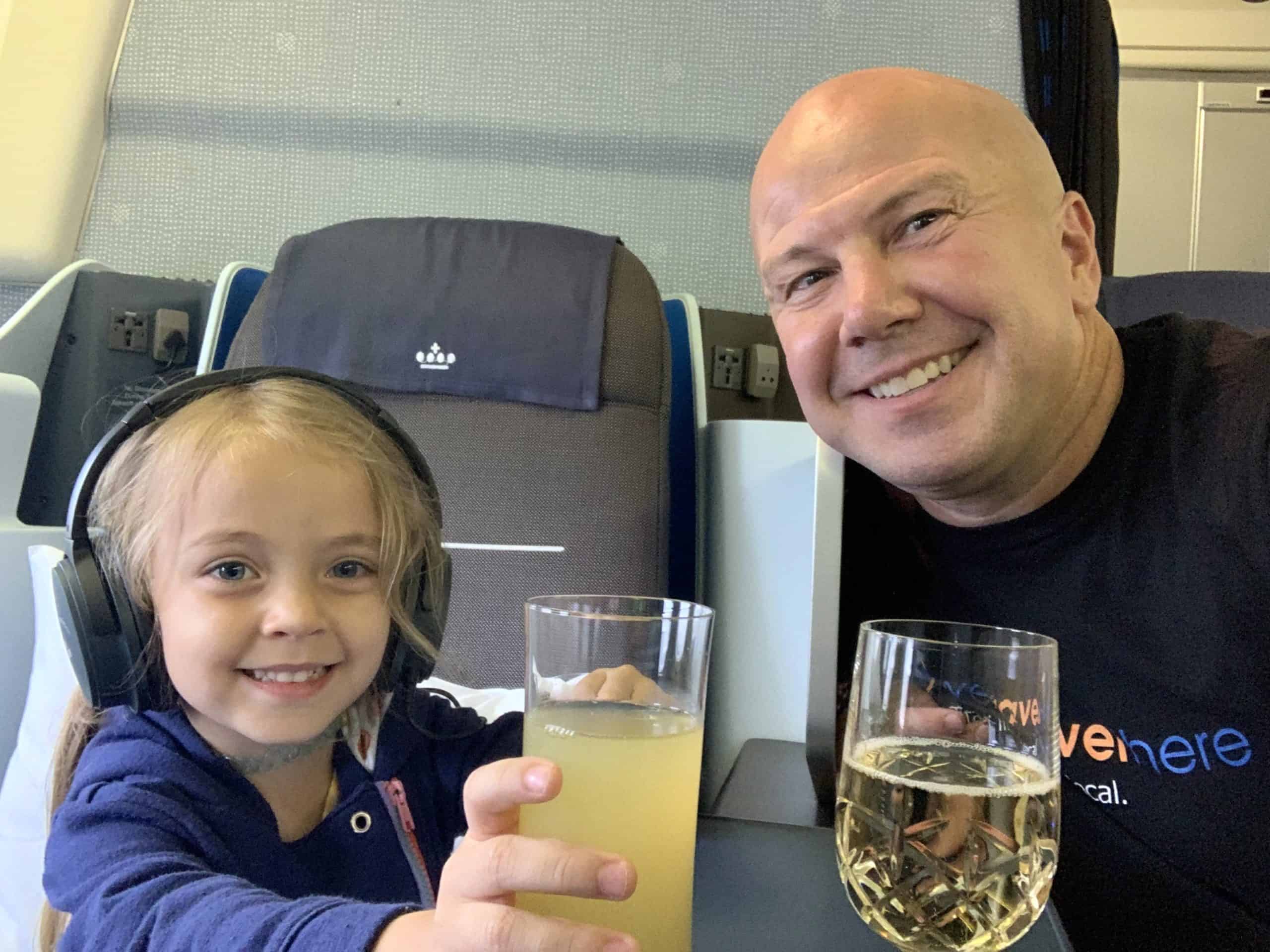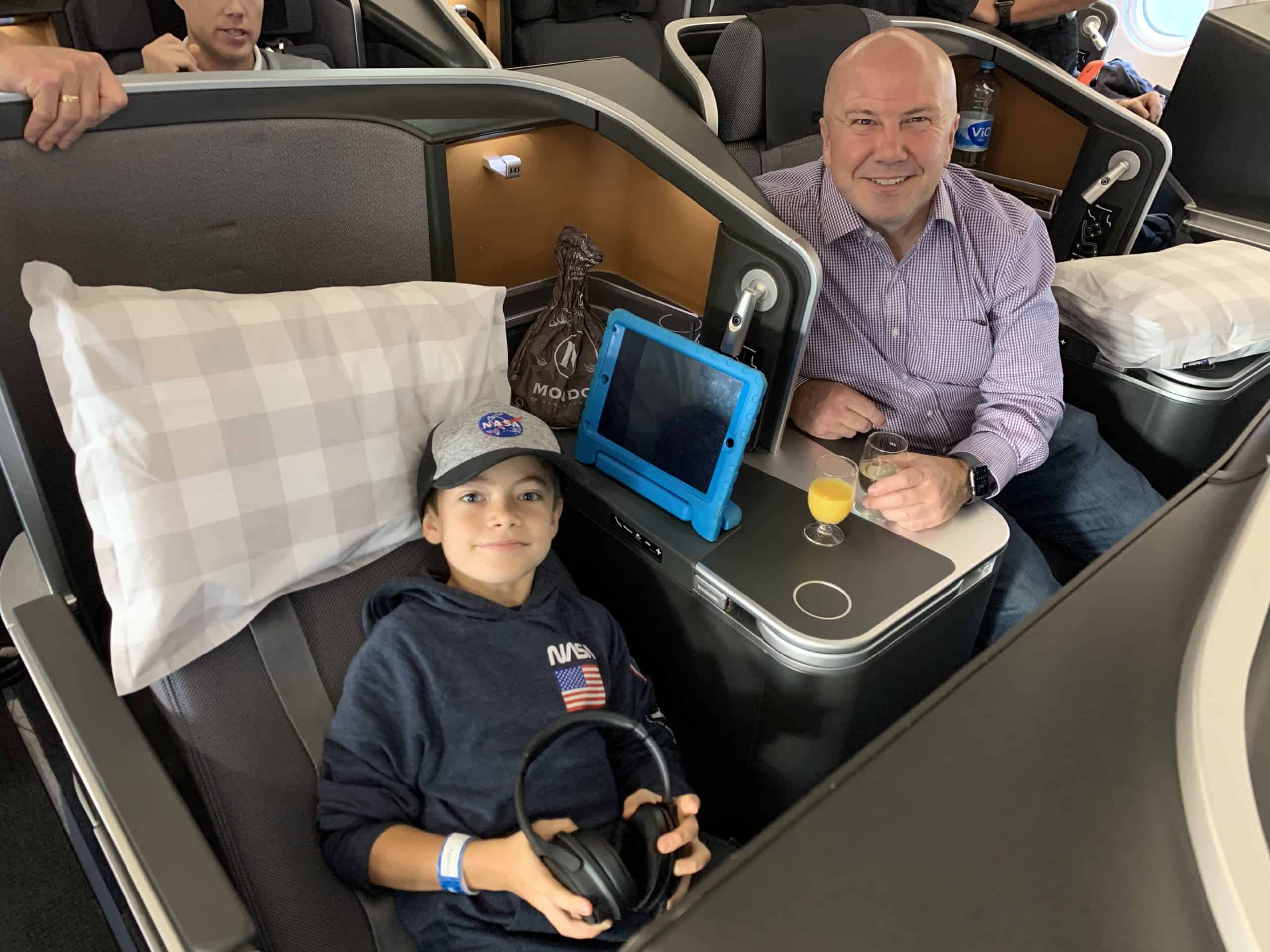I’m really excited to interview Bethany Walsh of Bougie Miles about how to start travel hacking. We’ve interviewed over 200 local experts about the best things to do in their cities, so we wanted to share our travel hacking tips to help you save money when traveling to these amazing destinations. Bethany and I have been writing about travel hacking strategies on our own websites and for some of the most popular online publications for the last decade. And we can’t wait to share some of our favorite tips with the listeners.
Please take a moment to subscribe to our podcast. It is available on all of the major podcast channels, such as Apple Podcasts, Google, Spotify, Stitcher, TuneIn, and iHeartRadio.

Scarlett and Lee on a KLM Business Class flight from Chicago to Amsterdam in August 2019.
How to start travel hacking
People love to travel, but no matter who you are, eventually your travel budget will run out. Using airline miles and hotel points to book your travel is an excellent way to make your dollars go further. In this podcast episode, we’re going to talk about why people are afraid, simple steps to get started, if it makes sense to pay an annual fee, and so much more.
If you’d like to learn how to travel for free using airline miles and hotel points, check out my free 7-day email course.
Why so many people are afraid of using miles and points to pay for travel?
I hear from a lot of people that they don’t use miles and points to pay for travel. They often say that it’s not worth the time or that it’s hard to get good value. While their fears have some merit, once you learn a few basic steps, you’ll get over those concerns very quickly. These are the tops reasons why people are afraid to start travel hacking:
- Unsure of how to redeem miles and points.
- Not getting good value for rewards.
- Booking on “wrong dates” or not far enough ahead of time.
- Earning the wrong miles and points.
- Not earning enough rewards to redeem for a flight or hotel.
Simple steps to get started
If you’re new to using miles and points to travel, follow these simple steps to get started towards earning your next free vacation:
- Welcome bonuses are your best friend.
- Earning rewards on every purchase that you make.
- Pay attention to category bonuses.
- Use other benefits of your credit cards.
- Maximizing flexible points.
Bank rules that prevent you from applying for too many cards
Credit card rewards can be very lucrative when used in the right way. Banks understand their value, so they limit how many credit cards you can get at once.
Welcome bonuses
Welcome bonuses are the easiest way for people to get a lot of miles and points very quickly. However, a credit card welcome bonus is very expensive for banks. It is a loss leader to attract new customers. If they are unable to keep you as a customer or to cross-sell you other products, the bank loses money on you. Because of that, they limit how often you can get a welcome bonus by signing up for a new credit card.
Minimum spend requirements
In order to earn your welcome bonus on a new credit card, you typically have to spend a certain amount of money within a short timeframe. On average, a travel credit card requires you to spend $3,000 within three months of opening the card. Some cards have lower requirements, while others have larger ones. It depends on what type of customer the card is targeting and how valuable the welcome bonus is.
Generally, once you meet the minimum spending requirements, your welcome bonus will post shortly after your credit card statement closes. If you don’t spend the required amount within the allotted timeframe, you miss out on the bonus. Before you apply for any credit cards, make sure that you can spend that amount without carrying a balance (aka paying interest) or spending more than you normally would (aka going into debt). Credit card rewards are not worth it if you’re paying a bank 15% to 25% or more in interest.
Bank application rules
Each bank has its own rules to limit how frequently you can apply for cards or earn a welcome bonus. Sometimes these rules apply to specific cards, while other times they apply to families of cards. Additionally, bank rules may apply just to your relationship with the bank or to your entire credit history. Some rules are published by the bank, while others are lessons learned and shared within the travel hacking community.
One of the most well-known rules is Chase 5/24. This rule limits applicated to five new cards from any bank in the last two years. If you have five or more new cards in the last 24 months, you will not be approved for a new credit card by Chase. The good thing is that most business credit cards do not report to your credit report, so they are not counted in this cap.
Other rules include:
- American Express “once-per-lifetime” rule. You can only get the bonus from each type of card “once per lifetime.” However, many people report being eligible again after seven years (which does feel like a lifetime). You may still get approved for the card, however, you will not earn another bonus.
- Bank of America 2/3/4 rule. Applicants can get approved for two new Bank of America cards within 60 days, three new cards within 12 months, and four new cards within 24 months.
- Capital One two-card rule. You may only have two Capital One credit cards open at any one time.
- Citi 8/65 rule. Citi will only approve one new card every eight days and two every 65 days.
Does it make sense to pay a credit card annual fee?
The short answer is… it depends. You have to look at the cost of the credit card versus the benefits you use. The concept behind learning how to start travel hacking is getting more value out of something than what you’re paying. It can be the most lucrative credit card in the world, but if you’re not using the benefits, the card isn’t right for you. For people who travel a couple of times a year, most travel credit cards are worth the annual fee because you’ll use the benefits.
However, that’s not always the case. For example, the Capital One Savor Card is an excellent card with up to 4% cash back on dining and entertainment. However, to break even on the annual fee, you’ll need to spend about $800 per month on dining and entertainment. Otherwise, you’re better off using the no-annual-fee Capital One SavorOne Card that earns an unlimited 3% on dining, entertainment, and groceries.
Hotel credit cards
Hotel credit cards are pretty easy to justify paying an annual fee. Many of them include valuable benefits that are worth more than what you pay, such as:
- Annual free night
- Automatic hotel elite status
- Night credits towards higher elite status
- More points on paid stays
Airline credit cards
Airline credit cards can be a harder decision because they don’t include free flights or automatic elite status. However, they do offer other perks that make your travel experience much better. Benefits vary by credit card, but may include some or all of the following:
- Free checked bags – typically $30+ per person each way
- Priority boarding
- Discounts on in-flight purchases (food, drinks, WiFi)
- Elite status miles based on spending
- Annual companion ticket
Flexible points cards
Flexible points cards are those that earn bank points that can be used like cash or can be transferred to airline or hotel partners. These cards are ideal for travelers that don’t have loyalty to a specific airline or hotel brand and want maximum flexibility when booking their trips. Benefits may include:
- Annual credits (travel, memberships, retail merchants)
- Airport lounge access
- Higher redemption values when booking travel (ex: 1.25x Chase Sapphire Preferred or 1.5x Chase Sapphire Reserve)
- Ability to transfer points to airline and hotel partners for potentially higher value
- Better travel protections – lost or delayed luggage, flight canceled or interrupted, rental car protection
Keeping track of all your miles and points
You work hard to earn your miles and points, but with so many programs, it can be a challenge to keep track of them all. And the last you want is for them to expire before you are able to use them. Bethany and I use amazing tools that help keep track of passwords, airline and hotel accounts, and credit card rewards so that we can stay organized. These are my favorites:
- Last Pass password manager. LastPass stores your passwords and automatically logs you in to your favorite sites. It also generates new passwords on command. (affiliate link)
- AwardWallet rewards program tracker. Tracks your miles, points, and travel reservations. (referral link)
New apps have recently been released that also track rewards, such as The Points Guy app, CardCurator, MaxRewards, CardPointers, and Travel Freely. I’ll be reviewing these in the coming months and will update this page once the reviews are completed.
Which miles and points should you focus on first?
In my free 7-day email course, I teach people to focus on where they want to travel, then work backward from there.
- Determine which hotels are there.
- Figure out which airlines fly there.
- Focus on earning those miles and points.
- Earn directly from co-branded credit cards
- Earn indirectly from flexible points cards that transfer to those programs.
- Maximize points from partners to accelerate your earnings.
For example, we flew to St Kitts in June 2019. The only major branded hotel options were the Park Hyatt and Marriott. So, even if you have millions of Hilton Honors points, you can’t book a Hilton hotel on the island because it wasn’t an option. We booked flights on American Airlines because they have cheap Caribbean flights. Overall, we saved several thousands of dollars by using miles and points for our family of four to spend a week in the Caribbean. And you can too!
The Bald Thoughts
I love earning miles and points so that my family can travel at a huge discount versus paying cash. Remember that the key to learning how to start travel hacking is that this is a marathon, not a sprint. Start slow and learn as you go so that you can continue earning travel rewards for many years. Focus on the miles and points you need for your next trip. And, even if you can’t pay for the entire trip using rewards, covering a couple of hotel nights or plane tickets for one or more of your family is a huge win. It’s ok to pay a credit card annual fee as long as you’re getting more out of it than what you’re paying. And be sure to keep track of your miles and points so that you can monitor your progress and know when to use them before they expire.
Who is Bethany Walsh?
Bethany Walsh is the founder of Bougie Miles, luxury travel brought to you by miles and points. When it comes to travel, you don’t need a lot of money to be #BougieAF. You do however need the right credit cards, the ability to hold points and frequent flyer miles until the right opportunity arises, and the knowledge to cultivate and maximize those opportunities. Bougie Miles is devoted to helping you travel the world in the most luxurious way possible while keeping your spending to a minimum.

Here are a few articles that she’s written:
- How to Choose the Best Travel Credit Card for You
- Crushing Life: How I Got 10,000 Miles and a 4-Star Room for $11
- How I Plan to Maximize Bonvoy Free Night Certs
You can connect with Bethany on her website and on Twitter, Facebook, Instagram, LinkedIn, and YouTube.
Big thanks to today’s podcast partner – Bluffworks
This episode is brought to you, in part, by Bluffworks. Whether I’m traveling for business or pleasure, it’s important to have clothes that make me look good AND feel great. I wear Bluffworks jeans, slacks, dress shirts, and blazers because they’re wrinkle-free and are designed for the modern traveler. And if they get dirty, a quick spin in the washing machine and they’re good as new.
Go to WeTravelThere.com/bluffworks and use the promo code from the image below to save 10% off your order. There are many styles to fit your needs so you can stay wrinkle-free when you travel.

Save 10% with promo code “LEE”
Stay tuned for our next episode
 Listen to the next episode when Logan Allec of LoganAllec.com shares the best things to do in Santa Clarita, California. In this episode, Logan and I talk about riding the coasters at Magic Mountain, exploring the William S. Hart Silent Film Museum, and searching for the Oak of the Golden Dream at the Placerita Canyon Nature Center. We hope you’ll join us when We Travel There.
Listen to the next episode when Logan Allec of LoganAllec.com shares the best things to do in Santa Clarita, California. In this episode, Logan and I talk about riding the coasters at Magic Mountain, exploring the William S. Hart Silent Film Museum, and searching for the Oak of the Golden Dream at the Placerita Canyon Nature Center. We hope you’ll join us when We Travel There.
What’s your favorite part of this episode? Send us a Tweet, let us know in the comment section below, or continue the discussion in our Facebook group!
Please take a moment to follow the podcast on Apple Podcasts or Stitcher so you don’t miss the next episode! While you’re at it, give us a rating and Tweet the podcast to your friends.
To see which cities we’ve interviewed and scheduled, please visit WeTravelThere.com/map. If you’d like to be a guest on the show, please submit an application at WeTravelThere.com/guest.









4 Pingbacks